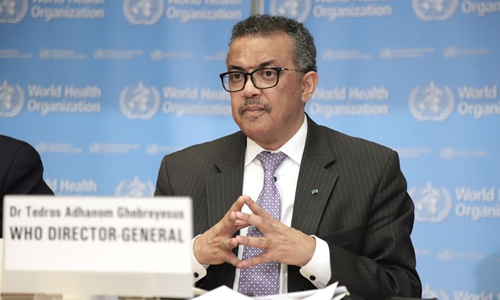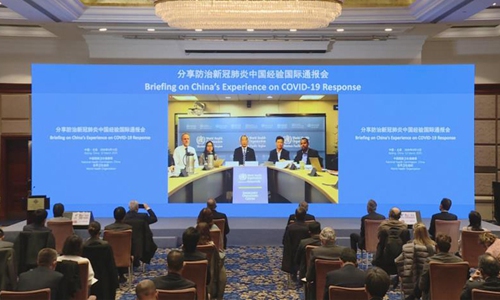Health assembly should not be diverted by political agenda: observers
By Liu Xin and Yang Sheng Source:Global Times Published: 2020/5/17 21:48:40
China welcomes WHO-led independent, fair investigation into all related nations

File picture shows World Health Organization (WHO) Director-General Tedros Adhanom Ghebreyesus speaks at a daily briefing in Geneva, Switzerland, on March 9, 2020. (Photo by Li Ye/Xinhua)
The World Health Organization (WHO) is scheduled to hold its 73rd World Health Assembly (WHA) in Geneva on Monday.
Experts called for participants to focus on effective international cooperation in battling the coronavirus pandemic rather than pushing other political agendas such as the US-led campaign to help Taiwan regain WHO observer status.
According to the assembly schedule seen on the WHO website, this year's assembly is expected to be accomplished within two days and to be held in the form of video conferences. The whole agenda is set to center on the COVID-19 pandemic.
The European Union will put forward a proposal to the WHA calling for an independent probe into the origins of the coronavirus, Bloomberg reported on May 5. The US has led calls for a probe into the origin of the virus and found support from Australia.
"Whether the draft for an international investigation would be approved at WHA is hard to say," Jin Canrong, associate dean of Renmin University of China's school of international studies in Beijing, told the Global Times on Sunday.
"We [China] never object to an investigation but firmly oppose an investigation led by the US targeting China. A fair international investigation led by the WHO on the virus origins should be conducted in all relevant countries, including the US," Jin said.
Zhu Feng, a professor of international relations at Nanjing University, told the Global Times on Sunday that as a responsible country, China has always been willing to cooperate with the WHO, including having an independent, fair and transparent investigation.
"And China is also working with other countries on other scientific researches, including vaccine developments. China opposed a US-led investigation, which targets China," Zhu said.
The US had "deliberately overlooked scientific research and spread conspiracies of the virus coming from a Wuhan lab," he said.
The WHO, whose main responsibilities are dealing with global public health, has become a battlefield for diplomatic affairs and international relations.
Although the US and EU both made accusations against China over the coronavirus, they have some differences, Cui Hongjian, director of EU studies at the China Institute of International Studies in Beijing, told the Global Times on Sunday.
The EU wants to have an independent probe into the virus origins, mostly to avoid a second spike, but the US, from the very beginning, has alleged that China was guilty, Cui noted.

China's National Health Commission (NHC) and the World Health Organization (WHO) jointly hold a video conference to brief China's experience on COVID-19 response to international experts from various countries and representatives of some embassies in China and international organizations on Thursday. Photo: screenshot of the NHC
Independence attempt
All experts reached by the Global Times Sunday called for the international community to concentrate on dealing with the ongoing COVID-19 pandemic and not let a political agenda divert attention at the WHA.
A diplomatic campaign led by the US to help Taiwan seek observer status at the health assembly worried Chinese mainland experts. They said such a political move may ruin international community's unity in fighting the ongoing COVID-19 pandemic.
As of press time on Sunday, more than 4,664,000 COVID-19 confirmed cases have been reported globally with the death toll reaching 312,327. The US has the largest number: 1,470,199 infections, according to data from John Hopkins University.
Backing the US, Australia, Britain, Canada, France, Germany, New Zealand and Japan issued a joint request to WHO Director-General Tedros Adhanom Ghebreyesus to invite Taiwan to attend on Monday, Foreign Policy magazine reported.
Zhu Feng the Nanjing professor told the Global Times that led by the US, some Western countries were cooperating with Taiwan. This was "actually using the international avenue for political purpose."
Some Western countries used the excuse that Taiwan attended the WHA as an observer from 2009 to 2016. But the then Taiwan leader Ma Ying-jeou did not object the one-China principle. However, the incumbent Taiwan leader Tsai Ing-wen and the ruling Democratic Progressive Party (DPP) rejected the principle, Zhu said.
"This shows the intention of the pro-independence forces in the island has always been seeking Taiwan's independence by seeking to join the WHO," he said.
Zhao Lijian, spokesperson for China's Ministry of Foreign Affairs, said at a press conference on Thursday that Taiwan could participate only under the one-China principle. But the DPP has refused to do this, so the political foundation for Taiwan's WHO participation had "ceased to exist."
Some Western media outlets and media in Taiwan reported that the Chinese mainland was under pressure and might be isolated as some countries voiced their support for Taiwan.
But Li Haidong, a professor at the institute of international relations at the China Foreign Affairs University in Beijing, told the Global Times Sunday that China would never be isolated by WHO members as most countries among the 194 member states "have no interest in discussing the political issue on the Taiwan region."
Some Western countries "have always considered they are representing the majority of the international community, but they might forget that the WHO has 194 member states in total," Li said. "Currently, only a handful of Western countries encouraged by the US support Taiwan, so who is the one being isolated?"
Some Taiwan-based analysts said that some Western countries have voiced their "supports" to Taiwan every year since 2017. But only a few of Taiwan's "diplomatic allies" made formal proposals to invite the island back to the health assembly, and almost no member states vote for these proposals, and some Taiwan's "diplomatic allies" even refused to made proposals at the request of the island's separatist authority because these countries want to build diplomatic ties with the Chinese mainland.
Foreign Policy reported Friday that there were signs that European governments which followed the US to voice support to Taiwan but were keen to avoid an ugly fight at the UN health agency in the midst of a pandemic were exploring the possibility of postponing consideration of Taiwan's status until the fall.
Although the island of Taiwan cannot attend the WHA as an observer, based on the one-China principle, the normal and necessary technical cooperation and information sharing between the island and the WHO have never been interrupted by political issue, said the mainland authorities.
Posted in: DIPLOMACY